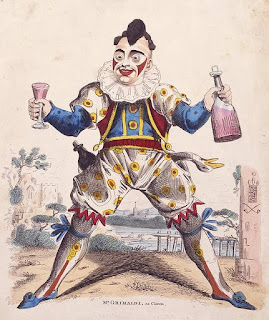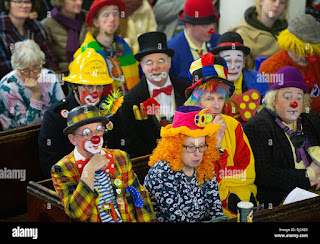I’ve always loved street markets and I’m sad that now, like all retail shopping, they’re being strangled by the internet. One of my favourite streets to walk down is the pedestrianised Exmouth Market in Clerkenwell. Who can say why certain streets lift your spirits? This one does, and this morning I decided to find out more about its history. Several shops are now empty, it isn’t flourishing as much as it was before the pandemic but it’s full of interesting, unusual shops, tempting restaurants and delicious foodie stalls.
This street and the wider area have a rich history, which started when a spa was discovered in the area in the 17th century. Exmouth Market was built on land formerly known as Spa Fields. Tea-gardens and other resorts grew up in this area from the late seventeenth century, and house-building began to take off in the second half of the eighteenth century,
At number 56 the great clown Joseph Grimaldi once lived in an elegant 18th century house. His father, Giuseppe, was an Italian immigrant, also a performer. Joey was 9 when his father died and he became the family's breadwinner, performing as Little Clown, a child prodigy who eventually became the most popular entertainer in Regency England. He developed the role of the Clown in the harlequinade that was part of the traditional pantomimes at Drury Lane, Covent Garden and Sadler’s Wells, which is just round the corner from Exmouth Market. His style of clowning had its origins in the Italian commedia dell'arte of the sixteenth century, and It’s because of him that clowns became known as “Joey” He invented what is still the classic clown face, painting a white base over his face, neck and chest and then adding red triangles to his cheeks, thick eyebrows and large red lips set in a grin. His most famous catchphrases were "Here we are again!", and "Shall I?", before some piece of mischief, which prompted the audience to yell back, "Yes!". His best-known song was "Hot Codlins", an audience participation song about a seller of roasted apples who gets drunk on gin while working the streets of London. I wish I’d see nis act, don’t you?
His first wife Maria, the daughter of the Sadler’s Wells Theatre manager, died during childbirth. After this tragedy he distracted himself by often performing two shows a night, one at Sadler's Wells and the other at Drury Lane.
This is a portrait of his second wife, Mary Bristow, by John James Masquerier. During one of his crazy routines, Grimaldi accidentally shot himself in his foot. His mother arranged for a dancer called Mary Bristow to attend to him in his sickness. They fell in love, married and had a son, Joseph Samuel, who tried to copy his father’s successful career but failed and became an alcoholic.
Like so many comedians, Grimaldi suffered from depression and used to joke, "I make you laugh at night but am Grim-all-day". A story is told, that ought to be true, that he once went to a famous doctor to ask for a cure for his depression, but didn’t give his name. The doctor recommended that he should go to see a performance of Grimaldi the clown to cheer him up. The patient stared sadly back and said, “I am Joseph Grimaldi.”
His stage act was so physically exhausting and damaging that when he was only 43 he was diagnosed with "premature old age". The Times noted in 1813:
"Grimaldi is the most assiduous of all imaginable buffoons and it is absolutely surprising that any human head or hide can resist the rough trials he volunteers. Serious tumbles from serious heights, innumerable kicks, and incessant beatings come on him as matters of common occurrence, and leave him every night fresh and free for the next night's flagellation."
Here he is at his farewell appearance at Drury Lane in 1828 – too weak to stand.
In his last years, Grimaldi lived in relative obscurity and became an impoverished alcoholic despite all the money he had earned. He outlived both his second wife and his son. When he died, aged 58, he was buried in St James Church, Pentonville Road. The church has since been demolished but the grave remains in what is now Joseph Grimaldi Park. Clowns from all over the country, gather each year to remember Joseph Grimaldi at the annual Grimaldi Church Service, which now takes place on the first Sunday in February from 3pm. at All Saints Church, Livermere Road, Haggerston, London E8. Here is a recent photo of them gathered in full motley – make-up and costume – to respect the memory of the “King of the Clowns” and the “Michelangelo of buffoonery.”
Exmouth market and the area around it went on to become a centre for London’s Italian community. The late nineteenth century Anglo-Catholic Church of Our Most Holy Redeemer looms over the street, which became a market in 1892. It was described as “one of the market streets of the poor … Stalls of fruit and vegetables, of cat's meat and embroidery, jostle one another.” A contemporary novel evokes an evening scene here with “naphtha lamps flaring, the smell of butchers' shops, the pease pudding, gutters full of vegetables. “
The market later declined and the street might have been abandoned to be carved up by property developers but, fortunately, it’s now in a conservation area. Whenever I approach it, I stare up admiringly at Finsbury Town Hall, a dazzling monument to late Victorian confidence built in a flamboyant style known, apparently, as Flemish Renaissance Revival. It’s full of gloriously indulgent turrets, carvings, friezes , domes and fake medieval windows. Finsbury stopped being a separate borough in 1965 when it was merged with Islington, but this eccentric building has survived as a dance academy and venue for weddings.
Happy Christmas, everyone!
.






No comments:
Post a Comment